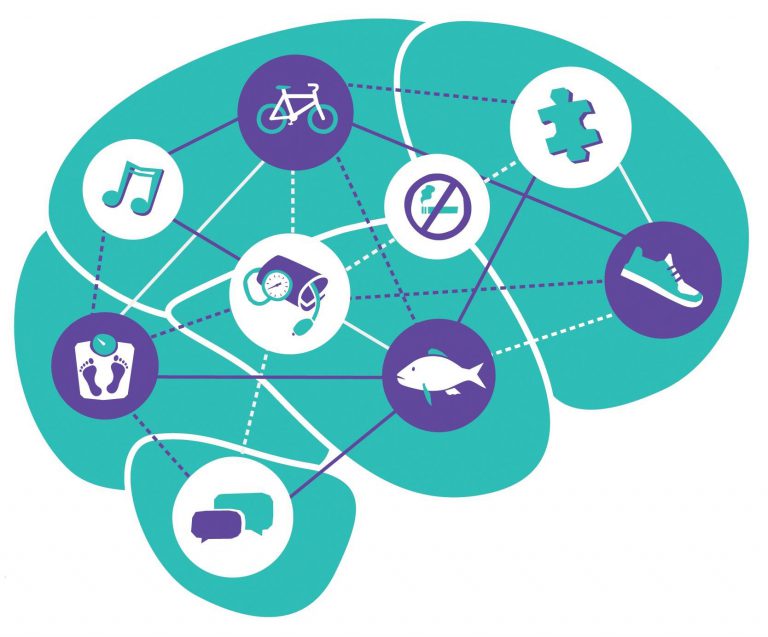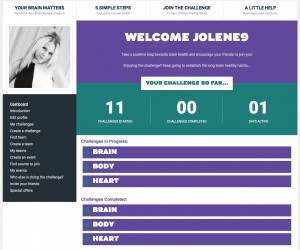Join Me and Pledge 21 Days to Improving the Health of Your Brain! Intrigued? You Should Be!

Sponsored post
Like many Australians, I started 2015 with the goal of becoming more active. With all three children at school this year, I anticipated that I’d be spending more time sitting at my desk writing, (a.k.a. less time in the park or out and about with my pre-schooler), so it made sense to make a regular time each day to exercise. Whether it’s a 30 minute walk, a few laps around the local oval, or dancing to a Zumba DVD, the positive effect that it has had is already quite obvious. I don’t always feel like doing it – like most people, I have those back and forth arguments in my head where I try to make excuses to myself about how busy I am today, and how I just don’t have time – but I always feel so much better afterwards.
No matter which activity I choose, (and some days it is just a brisk walk) my heart gets a good workout, and I also use and strengthen muscles and areas of my body – neither of which I would be doing if I was sitting stationary at my desk day in day out. But what I hadn’t considered is that this habit I’ve formed over the past few months, may also be good for my brain health!
What is a ‘Brain Healthy Lifestyle?’
Changes in the brain that result in dementia may start decades before any symptoms appear. Following a ‘brain health lifestyle’ may reduce the risk of developing dementia or delay its onset.
Leading a brain healthy lifestyle isn’t just for those in middle age, or older – you’re never too young to take care of your greatest asset – your brain!
The Your Brain Matter’s website has a wealth of information and ideas on how you can improve your brain health. I highly recommend visiting and having a good look around. I had great fun taking the quizzes on my first visit, and realised that my brain might need a little more training than I thought!
For anyone interested – the Brainyapp is Free to download and is another fantastic resource.
But in essence, the website shows that there are 5 simple steps to being brain healthy.
Step One: Look after your heart
Many people are unaware of the connection between heart health and brain health which is why we like to say, ‘what’s good for your heart is good for your brain’. The risk of developing dementia appears to increase as a result of conditions that affect the heart or blood vessels, particularly when these occur at mid-life.
They include:
Step Two: Do some kind of physical activity
Physical activity increases blood flow to the brain, stimulates the growth of brain cells and the connections between them, and is associated with larger brain volume. It reduces the risk of high blood pressure, obesity, diabetes and high cholesterol, which are associated with an increased risk of cognitive decline and dementia. Read more
Step Three: Mentally challenge your brain
It could be learning a new language, taking up a new sport, doing a course in something you’re always wanted to do – anything really, as long as it’s learning something new. Challenge yourself often and keep learning new things throughout life.
Higher levels of mental activity throughout life are consistently associated with better brain function and reduced risk of cognitive decline and dementia. Read more
Step Four: Follow a healthy diet
Your brain needs a range of nutrients to function properly. Evidence suggests that a healthy, balanced diet may help in maintaining brain health and functionality but more research is needed to understand if there are specific foods that may be able to reduce the risk of dementia.
Several studies have found that a high intake of saturated fats, such as those found in meat, deep fried foods and takeaway food and trans fats often found in pies, pastries, cakes, biscuits and buns are associated with an increased risk of dementia. So what you eat could affect your brain. Read more
Step Five: Enjoy social activity
To help look after your brain health it’s important to be social with people whose company you enjoy and in ways that interest you.
Social engagement has been found to have benefits for other health factors related to cognitive functioning, such as vascular condition and depression. It is mentally stimulating and may contribute to building brain reserve which then contributes to a lower dementia risk. Read more
There are probably lots of great things that you are already doing for your brain without even realising it, but it is worth also taking a moment to think about any areas where there might be room for improvement.
For me that is probably steps four and five.
Whilst I always ensure that we eat lots of veggies everyday, and that the kids eat at least 2 pieces of fruit each day…I confess, I am not much of a fruit eater myself. I’m not even sure why. It’s not like I dislike it. Maybe it comes back to that same old lame excuse that I’m just too busy! But eating an apple at morning tea each day is certainly a small step that I can take to improve my own diet and brain health.
Likewise, I could certainly do a bit better on the social activity front too, and plan on scheduling some more family activities, and catch ups with girlfriends into my week. I’ve even let a friend talk me into a ladies bootcamp on a Monday night! That’ll be ticking the exercise and social activity box – if we have any breath left to be able to talk at the end of it!
Armed with all this new information and inspiration on the fun ways I can incorporate brain health into my everyday life, I’m looking forward to making some changes and forming some healthy lifestyle habits. As part of Mum’s Lounge support of Alzheimers Australia , I am joining the Your Brain Matters Challenge – 21 Days of healthy brain habits, and I would love you to join me.
How the Challenge works
Fancy yourself a budding artist, chef or photographer? Always dreamt of speaking fluent French or mastering an instrument? There’s never been a better time or reason to start doing the things you love.
Research suggests certain lifestyle and health factors are good for the brain, body and heart and can help reduce the risk of developing dementia.
It’s easier than you might think: Keeping your brain stimulated, your body fit and your heart healthy is fun. So why not start your journey to living a brain-healthier life?
The 21 Day Challenge is asking you to pledge a commitment to your brain health and spend the next 21 days enjoying your new experience.
Take a positive step towards brain health and encourage your friends to join you!
Enjoy the challenge? Keep going to establish life long brain healthy habits.
It won’t cost you a thing. You just have to start something new.
Join the challenge.
This post is sponsored by Alzheimers Australia. However all thoughts and opinions expressed here are my own.














